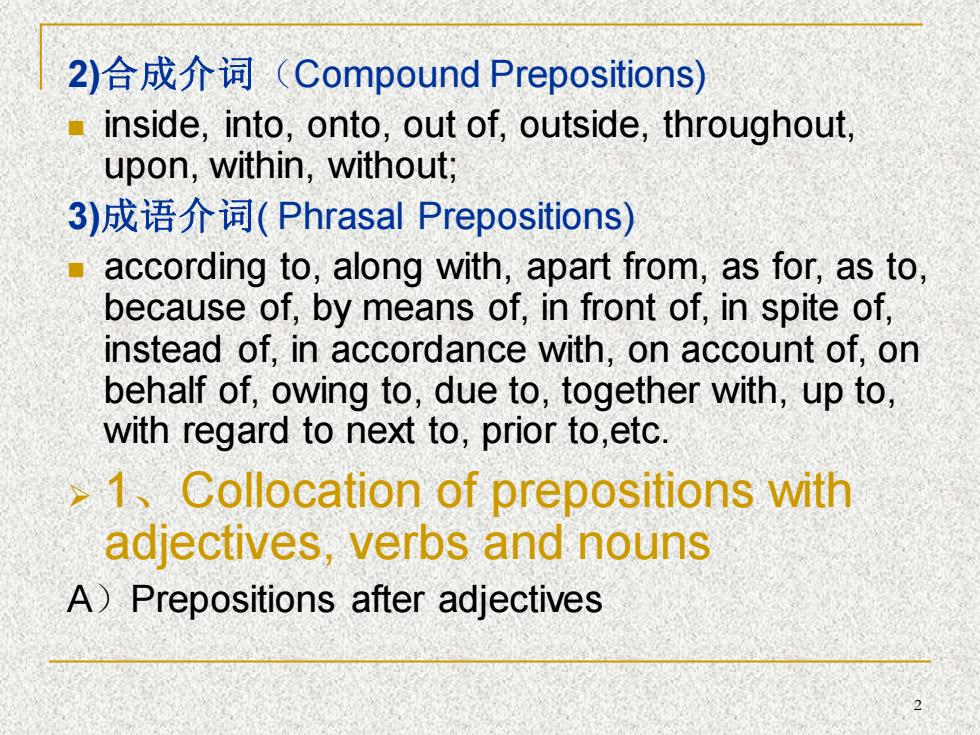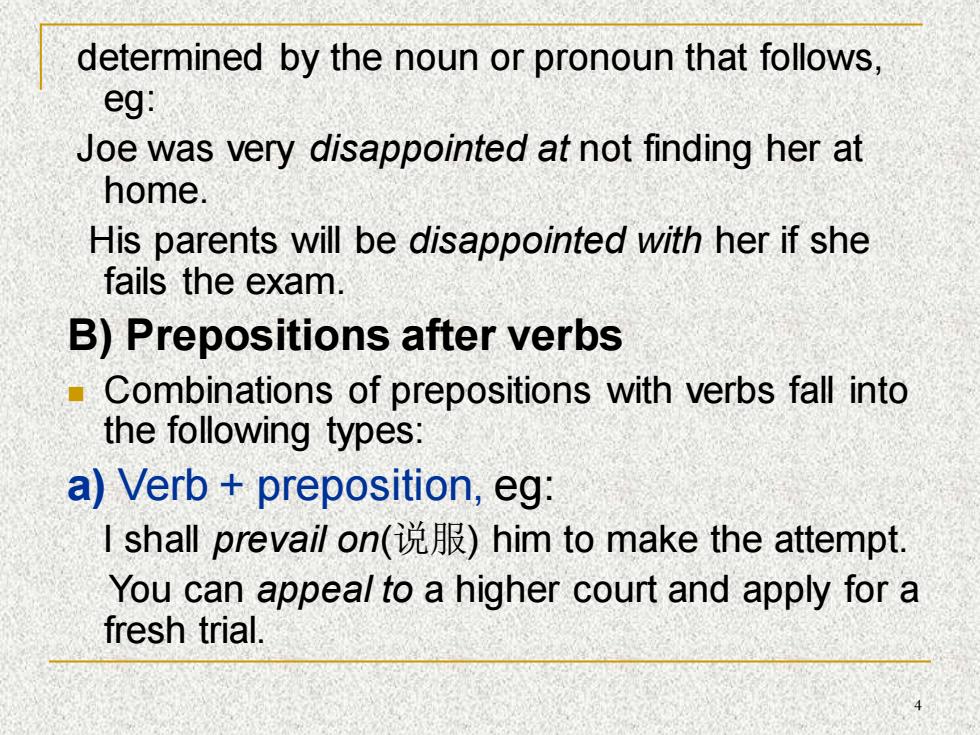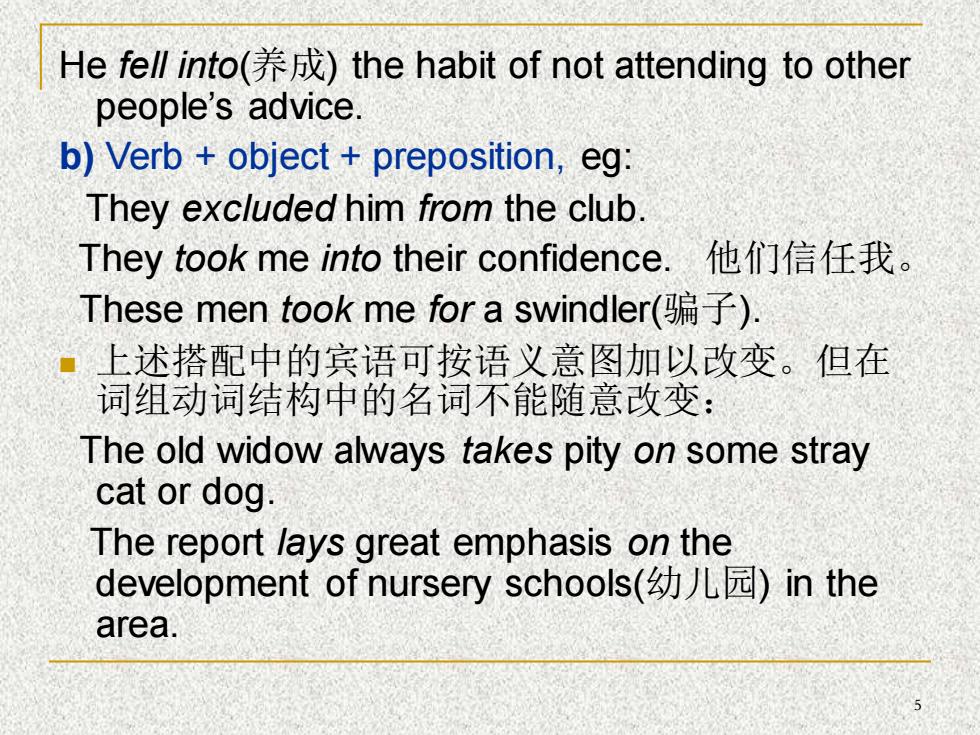
十一、介词(preposition) Prepositions are a class of structural words that indicate various semantic relations between words or expressions.Prepositions are usually divided into the following three types: 1)简单介词(Simple Prepositions) about,across,after,against,among,around,at, before,behind,below,beside,besides,between beyond,but,by,down,during,except,for,from, in,like,of,off,on,over,near,past,round,since, through,till,to,towards,under,until,up,with,per, via;
1 十一、介词(preposition) ◼ Prepositions are a class of structural words that indicate various semantic relations between words or expressions. Prepositions are usually divided into the following three types: 1)简单介词(Simple Prepositions) ◼ about, across, after, against, among, around, at, before, behind, below, beside, besides, between, beyond, but, by, down, during, except, for, from, in, like, of, off, on, over, near, past, round, since, through, till, to, towards, under, until, up, with, per, via;

2)合成介词(Compound Prepositions)) inside,into,onto,out of,outside,throughout, upon,within,without; 3)成语介词(Phrasal Prepositions) according to,along with,apart from,as for,as to, because of,by means of,in front of,in spite of, instead of,in accordance with,on account of,on behalf of,owing to,due to,together with,up to, with regard to next to,prior to,etc. >1.Collocation of prepositions with adjectives,verbs and nouns A)Prepositions after adjectives
2 2)合成介词(Compound Prepositions) ◼ inside, into, onto, out of, outside, throughout, upon, within, without; 3)成语介词( Phrasal Prepositions) ◼ according to, along with, apart from, as for, as to, because of, by means of, in front of, in spite of, instead of, in accordance with, on account of, on behalf of, owing to, due to, together with, up to, with regard to next to, prior to,etc. ➢ 1、Collocation of prepositions with adjectives, verbs and nouns A)Prepositions after adjectives

Adjectives can collocate with prepositions to form adjective phrases.Some adjectives can only be followed by specific prepositions (eg: rich in,intent on(一心想),indifferent to,etc),but there are other adjectives that can collocate with different prepositions to express different meanings[eg:“alive to”means“having full knowledge of'(敏感);“alive with”means “covered with(living things)"(充满),etc]. There are also adjectives that can be followed by different prepositions without change in meaning,the choice of prepositions being
3 ◼ Adjectives can collocate with prepositions to form adjective phrases. Some adjectives can only be followed by specific prepositions(eg: rich in, intent on(一心想), indifferent to, etc), but there are other adjectives that can collocate with different prepositions to express different meanings [eg: “alive to” means “having full knowledge of”(敏感); “alive with” means “covered with (living things)”(充满), etc]. ◼ There are also adjectives that can be followed by different prepositions without change in meaning, the choice of prepositions being

determined by the noun or pronoun that follows, eg: Joe was very disappointed at not finding her at home. His parents will be disappointed with her if she fails the exam. B)Prepositions after verbs Combinations of prepositions with verbs fall into the following types: a)Verb preposition,eg: I shall prevail on(说服)him to make the attempt,. You can appeal to a higher court and apply for a fresh trial
4 determined by the noun or pronoun that follows, eg: Joe was very disappointed at not finding her at home. His parents will be disappointed with her if she fails the exam. B) Prepositions after verbs ◼ Combinations of prepositions with verbs fall into the following types: a) Verb + preposition, eg: I shall prevail on(说服) him to make the attempt. You can appeal to a higher court and apply for a fresh trial

He fell into()the habit of not attending to other people's advice. b)Verb object preposition,eg: They excluded him from the club. They took me into their confidence.他们信任我。 These men took me for a swindler(骗子). 。上述搭配中的宾语可按语义意图加以改变。但在 词组动词结构中的名词不能随意改变: The old widow always takes pity on some stray cat or dog. The report lays great emphasis on the development of nursery schools(幼儿园)in the area
5 He fell into(养成) the habit of not attending to other people’s advice. b) Verb + object + preposition, eg: They excluded him from the club. They took me into their confidence. 他们信任我。 These men took me for a swindler(骗子). ◼ 上述搭配中的宾语可按语义意图加以改变。但在 词组动词结构中的名词不能随意改变: The old widow always takes pity on some stray cat or dog. The report lays great emphasis on the development of nursery schools(幼儿园) in the area